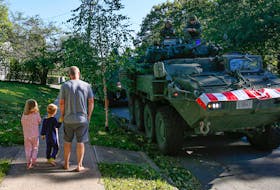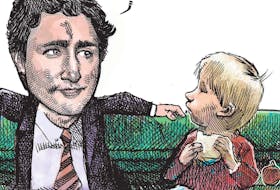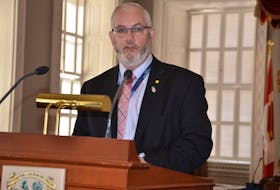
For Bob Gladney, that summer’s day in early June 35 years ago was not unlike any other he’d spent in his native Clarenville.
It’s too long ago, of course, to remember exactly what it is he was doing, but more than likely Gladney was hanging out with the boys or off troutin’ somewhere.
This much is certain: he wasn’t home waiting for the phone to ring, or in the ballroom of Montreal’s Mount Royal Hotel, fidgeting in his seat hoping to hear his named called.
Yup, things certainly have changed with the NHL Draft.
“No, I wasn’t interviewed on TV, wasn’t called to the big stage to put a jersey on,” chuckles Gladney today. “I was back in Clarenville, off doing whatever. No more exciting than that.”
The call eventually came, from the Toronto Maple Leafs, who made the defenceman from Newfoundland the 24th overall selection in the 1977 NHL Amateur Draft, as it was known then. As the sixth pick of the second round, tabbed one slot ahead of tough Brandon Wheat King junior Dave Semenko, and 12 spaces ahead of relative unknown U.S. collegian Rod Langway, Gladney became the highest-selected Newfoundlander in the NHL draft.
In 1971, Grand Falls star defenceman Terry French was nabbed with the 25th overall pick by the Montreal Canadiens, only five spots behind another Canadiens’ pick, a lanky defenceman named Larry Robinson.
But getting back to Gladney. He figured to be drafted in the ’77 lottery — a draft perhaps best known for the fact 14 teams overlooked Mike Bossy before the New York Islanders tabbed him at No. 15 — following three impressive years with the Ontario Hockey League’s Oshawa Generals.
Gladney had been a young star in Clarenville, but unknown outside Newfoundland. That was until he attended the very first Canadian midget hockey championship in 1973-74, the Wrigley. Gladney opened a lot of eyes, and the Generals used their sixth overall pick in the OHL draft to select the Newfoundlander.
And he didn’t disappoint. For the next three years, Gladney would register 62, 78 and 62 points for Oshawa.
Entering his third OHL season, Gladney’s name was tossed about as a potential NHL draft pick. But unlike today, with the Draft Combine, endless draft previews and live coverage on draft day, there was very little fanfare back in 1977.
“Oh no, there was definitely none of that. Not at all,” he says, to great laughter. “I suppose I knew I would be, from word of mouth, drafted in the first couple of rounds, but you didn’t know if you were going to be a first-rounder or not.”
Gladney might have seen his stock drop a bit because he languished in Oshawa, which managed only five wins in 66 games in 1976-77. He said there was some discussion about trading him in his final year, but in the end, the Generals’ owners elected to keep their high-scoring rearguard.
Gladney can’t recall who it was from the Leafs who called him, though he thinks it was former coach, assistant GM and then-current scout Johnny McLelland.
“He basically told me Toronto had selected me 24th overall, that they were pleased, and congratulations. No more hoopla than that. It was a short chat.”
Shortly afterwards, Gladney got a call from his agent, Alan Eagleson. And then came a letter in the mail, from the Leafs, instructing their pick to maintain an exercise program for the remainder of the summer.
“Looking back, I would have done essentially what they asked me,” he said, “but not to the extent now where there’s a lot more emphasis on training and conditioning. Geez, there’s diets and everything else these days.
“The reality of that era was the veterans went to camp and the teams said, ‘You’re a little overweight. You had a good summer,’ and the guys hit the ice to get in shape.
“I know it’s totally different now. I’m in touch with a couple of guys whose sons are (in the NHL) and they get a few weeks’ break, but then they’re back working out over the whole summer to get ready for camp. And they’re not trying to make the team. They’re established players.”
Gladney headed to Toronto two weeks before training camp opened, and skated with some of the Leaf veterans of the day.
“That was about as much preparation that I initiated, which I thought was adequate,” he recalls. “It wasn’t something the team had pieced together. It was certainly more haphazard, less structured than what it would be today, I’m assuming.”
Toronto had a job opening on the blueline that season, but rather than go with Gladney, the Leafs opted to keep fellow rookie Trevor Johansen on the roster. Johansen had been selected 12 spots ahead of Gladney in the draft.
Gladney was optioned to Saginaw of the old International league, and responded with 65 points as a rookie defenceman.
The next season, another job opened in Toronto, but by then the Leafs had fired GM Jim Gregory, who had selected Gladney. This time, Toronto elected to go with Joel Quenneville, who was the Leafs’ first pick, 21st overall, in the 1978 draft.
Gladney would go on to play another four years in the minors, before getting his crack at NHL in 1982-83 after joining the Los Angeles organization.
That year, he played his first NHL game with the Kings.
Gladney, coming off a first-team AHL all-star season, signed with Pittsburgh in the off-season and made the Penguins out of training camp, where he had a goal and five assists in 13 games.
Still, he was optioned to the Baltimore Skipjacks of the American league, and 13 games later, was clipped in the eye by a stick in a game against the Rochester Americans.
He would never play again.
Today, the 55-year-old Gladney lives in Riverview, N.B., where he’s a civil aviation inspector with Transport Canada. He bikes to work quite a bit, but a sore knee — the result of an old hockey injury — does not allow him to run anymore.
And it’s been at least 19 years — since he moved from Newfoundland to New Brunswick — since he’s had a game of hockey.
Robin Short is The Telegram’s Sports Editor. He can be reached by email [email protected]








